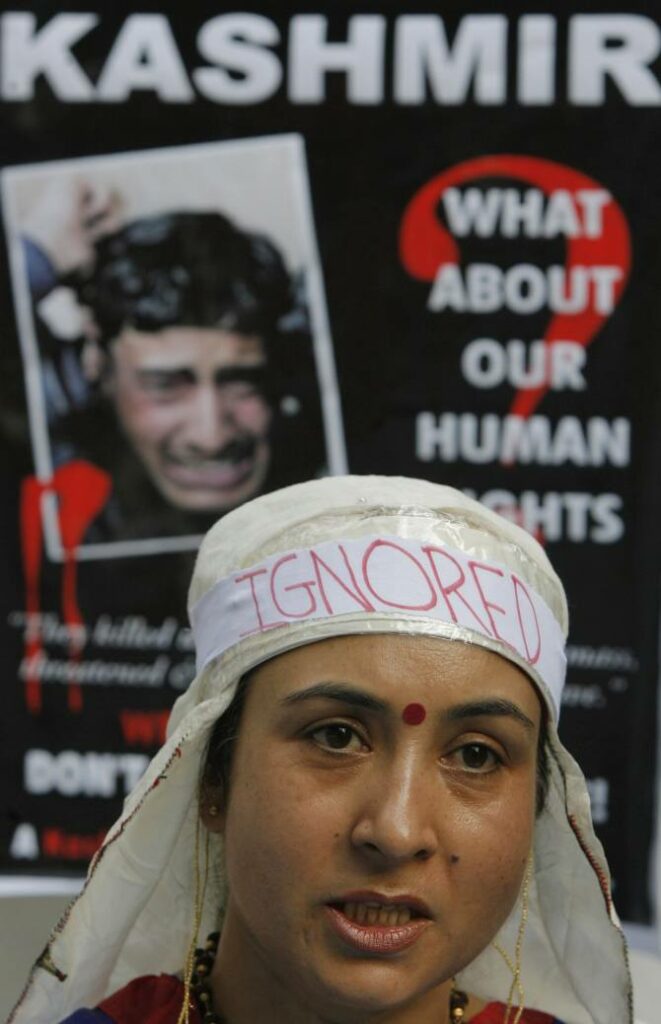
- The world has never concerned itself with the misery of the Hindus, let alone the sufferings of the Kashmiri Pandits who have endured innumerable atrocities, many genocides and exoduses.
- Despite the few initiatives taken by leaders to highlight the cause of the Kashmiri Pandits, their struggle persists as most of the initiatives are marred by those seeking political dividends.
- While the world remains uninformed, the responsibility of highlighting the cause of the Kashmiri Pandits will have to be borne by those of us who are genuinely concerned about finding a resolution.
On 23rd March 2003, 24 Kashmiri Pandits were massacred by the terrorists associated with the Lashkar-e-Taiba in Nadimarg, near Shopian in the Pulwama district. It was internationally condemned including US officials, Pakistani journalists and UN officials. More than two decades have passed since the massacre and the Kashmir Pandit community remembers it, albeit by community outreach and by sharing in their respective media pages. But that’s it, nobody else recalls it and that has been the way since 2003.
Why has this happened? Has the world forgotten the horror that led to this massacre? Has the world ever wondered all these years why the Kashmiri Pandit community continue to reside in the valley despite the horrors meted out to them, right from the cruel reign of Sikandar Bhustikan and the treachery of Suhubhatta?
In reality, the massacre has been forgotten. The world is not just guilty but also responsible for the sheer denigration of the repeated genocide of the Kashmiri Pandits over the centuries. Their suffering delves into many complex realms including the trans-generational trauma which has a different effect every time the baton of keeping the fire lit for the Kashmiri Pandit passes from one generation to the next. Today, activism has become diverse as the burden of a community is also in redirecting the world’s attention towards the mental suffering of those who strive to convey the significance of the pain endured by them and their forefathers. It is not to blame the new generations of the Kashmiri Pandit community, as many endeavour to carry the light of their forefathers. But the overall engagement gives just half a chance of treating these issues with the same importance as the previous generation did.
The focus must not be on the Kashmiri Pandits alone. Nowadays, the change in the community’s identity from the Kashmiri Pandit community to the Kashmiri Hindu community is a reaction to the renewed interest of other sections of the Hindu and the Indic faith in the history and the atrocities that have occurred against the Kashmiri Pandits for centuries. In some ways, a change in identity is worthy of introspection. The stakeholders of the community may feel it’s the only way to enable more attention. They may also seek to associate themselves with more equanimity with other similar varna or jati sections. Alternatively, they may feel the need to shed the identity that is routinely used by the opponents to target and not acknowledge the atrocities meted out to them. The identity has, in many informal discussions, come up as a point of contention within the Hindutva fold and, as homogenous as it sounds, some who carry the word of critique do it at the behest of their political patronage and not out of genuine concern.
When the misery of Hindus is brought up, being part of the Hindu fold and especially being part of the Brahmin Varna, it is bound not to be part of the issues the world concerns itself with. The world has the unfortunate habit of valuing a Hindu life less than others. Notable examples include the Rohingya Hindu issue. The world neglected the horrifying accounts the Rohingya Hindus faced at the hands of the Muslims there. Even a controversial organization like Amnesty International pointed it out, but it never grabbed the attention as much as the perceived atrocities on Muslims did. If that’s not an indication of how things have been, nothing else is. The world never acknowledged the atrocities faced by Hindus as evidenced while drafting the genocide law in the United Nations itself. This shows the least priority given to the loss of life of those who identify themselves as Hindu. If the 10 stages of Genocide are referred to, the genocide of Kashmiri Pandits and Hindus in history has worked the same way but the world has been in denial.
Now that we understand the world’s forgetfulness, what do we expect would be the reason for it? Is being a non-military clan the reason for it? Let’s delve into the historical accounts of arms. The issue would be significantly elevated if the community had used arms because history has its twisted ways of remembering events in specific ways. The history of the Sikhs remains a word-of-mouth point of armed resistance since they bore arms. Even if they faced atrocities, it is the armed aspect of it that remains in the minds of the people.
Furthermore, the strength of the community in numerical terms seems to be the other reason. In this era, which the Hindu scriptures call as Kalyug, the mindset of the numerical strength of a community impacts an individual’s fortitude, as they do not go beyond a particular area of concern they are currently afflicted with. They simply are too busy or too apathetic, even within the Hindus, so the repeated examples of genocide do not matter to them. Hence, they eventually forget. Beyond the aspect of the community’s numerical strength, it is the identity of the Hindu that seems not to hold value for those outside and many within Bharat. The Kashmiri Pandits seem to understand this and know the consequences. Hindus by nature are usually not invested in breaking social laws and norms which is both a boon and a bane. This is because the Muslim community easily demonstrates its numerical strength on the streets. Consequently, the element of fear and mobility is instilled in others, which isn’t a daily experience for Hindus and this impacts their interests. This dynamic also applies to the Kashmiri Pandit community.
Despite the few initiatives taken by leaders across the political spectrum to highlight the cause of the Kashmiri Pandits, their struggle persists. As raising concerns with the administration remained an avenue of exchange for the Kashmiri Pandits, most of the initiatives were marred by those seeking political dividends. Although much has changed since 2014, the sufferings of the Kashmiri Pandits are still unknown to the world as it remains ignorant about it. While few statements of encouragement have been made, and events to recognise their sufferings have increased, the world has yet to grant the same attention it gives to the communities that have faced similar atrocities. Therefore, while the world remains uninformed, the responsibility of highlighting the cause of the Kashmiri Pandits will have to be borne by those of us who are genuinely concerned about finding a resolution.
(Anhad Jakhmola is a postgraduate scholar in international relations. He has his undergraduate degree in history and is pursuing his Ph.D. in Defence and Strategic Studies. He is a columnist for many portals and is a keen public speaker in debates and discussions. Views expressed are author’s own)

